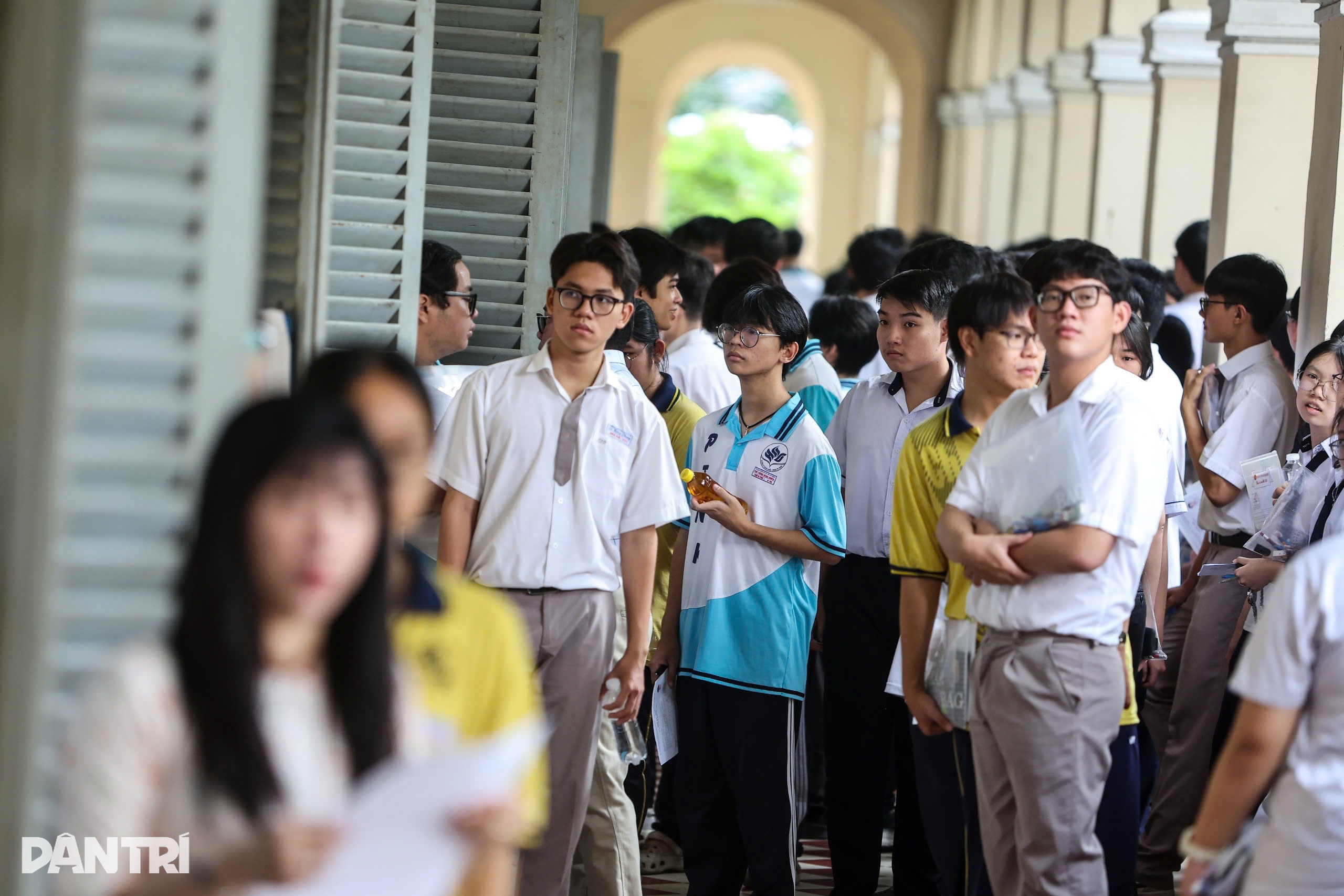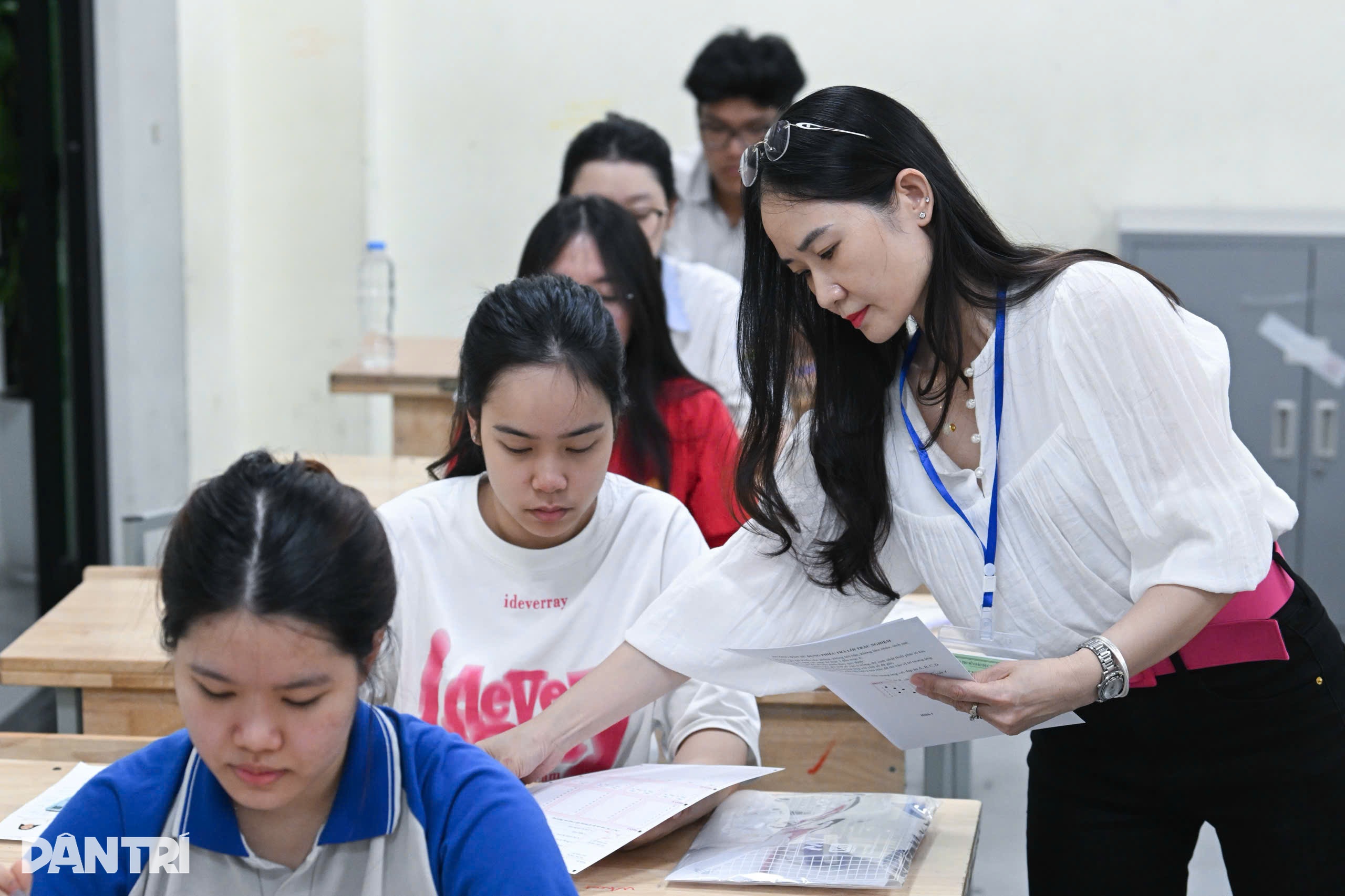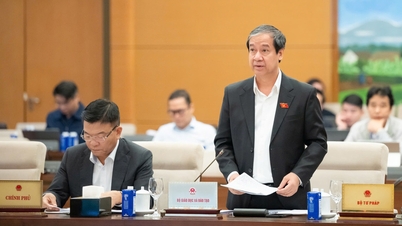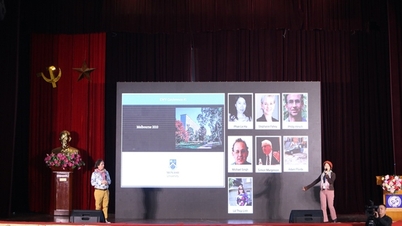In recent years, and especially at the present time, the policy of decentralization and delegation of power in state management has been and is being vigorously implemented by the Party and the Government in many fields, including education and training.
Resolution No. 29-NQ/TW on fundamental and comprehensive reform of education and training clearly states the need to strengthen the autonomy and accountability of educational institutions and appropriately decentralize authority to localities.
The high school graduation exam is one of the most important exams for Vietnamese students, marking a crucial transition from general education to higher levels of education. In recent years, the Ministry of Education and Training (MOET) has designed the exam questions and organized it uniformly nationwide, with the same exam format and questions. The remaining aspects have been left to local authorities to manage independently.
The exam has many advantages in terms of fairness, transparency, and standardization. However, in the context of educational reform and the need for decentralized management, this model is revealing many shortcomings regarding flexibility, cost, and suitability to local conditions.
Therefore, considering the decentralization of exam organization to provinces and cities is a necessary and inevitable step to adapt to reality and comprehensively reform the education system.
Why is it necessary to decentralize the high school graduation exam to local authorities?
The main objective of the high school graduation exam is to accurately assess students' learning outcomes according to the goals and requirements of the General Education Program. At the same time, the exam serves as one of the bases for evaluating the quality of teaching and learning in educational institutions and the effectiveness of educational management agencies.
Organizing examinations in a way that is streamlined, effective, efficient, fair, and appropriate to the actual conditions is always a matter of public concern.
In the current context, the Party and Government have adopted a policy of strong decentralization in education management to promote the role of localities, while simultaneously increasing autonomy and creativity in education. Decentralizing the organization of the high school graduation exam to the provinces is considered a step in line with this policy.

Decentralizing the organization of the high school graduation exam to the provinces is seen as a step in line with the policy of strong decentralization in education management (Photo: Trinh Nguyen).
First of all , each province has different economic, social, infrastructure, and educational conditions. Decentralizing the organization of the high school graduation exam to local authorities helps create flexibility and adapt to the specific circumstances of each region.
Provinces can proactively adjust the organization and location of exams to ensure the most convenient and safe conditions for students. Especially in remote, mountainous, or island areas, organizing exams locally will reduce travel difficulties and give students a more complete and fair opportunity to take the exam. This is entirely consistent with the provisions of Article 34 of the 2019 Education Law.
Secondly , the policy of strong decentralization in education management not only affirms the autonomy of localities but also promotes increased responsibility and efficiency in organizing educational activities.
In this context, Ho Chi Minh City's proposal to organize its own local examination is not only a practical need but also aligns with the major policies of the Party and the State, aiming to improve the quality of education in each region.
Furthermore, decentralizing the organization of the exams to the provinces helps increase flexibility in responding to unexpected situations such as epidemics or natural disasters. During the COVID-19 pandemic, many localities had to adjust their exam schedules and organizational plans to suit the actual situation.
If each province organizes the event independently, they will be able to respond promptly, minimizing disruption for candidates and their families.
Thirdly , the proposed amendment to the 2019 Education Law, which would grant high school diplomas to high school principals, will increase the role and responsibility of schools in managing, inspecting, and evaluating students.
When principals are given the authority to issue diplomas, schools will be more proactive in organizing internal tests/exams, monitoring learning quality, and enhancing accountability for student results. This also contributes to promoting educational decentralization, creating a more flexible and transparent environment.
In particular , decentralizing the organization of exams, coupled with reforms in teaching and assessment at the local level, will help ensure that exams accurately reflect students' abilities and quality.
Local authorities can proactively develop exam questions that are appropriate to the curriculum and the characteristics of local students, thereby motivating teachers to innovate teaching methods, enhance skills training, critical thinking, and the application of practical knowledge for students.
A hierarchical approach to testing and evaluation will contribute to promoting student-centered teaching and learning, aiming towards the goal of holistic education.
Delegating the organization of the high school graduation exam to local authorities reduces the burden on the central government.
Currently, after the reorganization of administrative units, the country has 34 provincial-level administrative units, each with different socio-economic conditions, educational infrastructure, and natural characteristics. Furthermore, Vietnam is a country with a long geographical stretch from North to South, encompassing plains, mountains, and islands.
Therefore, weather conditions vary greatly between regions, and natural disasters, storms, and floods occur unevenly in time and space, frequently disrupting learning and examinations in many localities.

Students taking the high school graduation exam in Ho Chi Minh City (Photo: Trinh Nguyen).
In this context, organizing the high school graduation exam in a centralized model, simultaneously across the country, is revealing many shortcomings in terms of flexibility, safety, and effectiveness, especially in mountainous and remote provinces, where transportation, examination conditions, and harsh weather are frequently challenging.
Decentralizing the organization of the high school graduation exam to local authorities ensures uniformity in the chain of responsibilities. Specifically, the province is the administrative unit directly managing high schools, understands local characteristics, and has the capacity to organize the exam according to actual conditions.
Furthermore, in any education system, the person granting the degree needs to simultaneously control or manage the student assessment process. When the principal is empowered to grant degrees but lacks the authority to decide on or organize examinations, the chain of responsibility is disrupted and lacks cohesion.
Granting local authorities full authority to organize the exams is a step towards perfecting the mechanism: the person responsible for evaluating learning outcomes is also the one who signs to certify the validity of the diploma. In particular, in this context, granting high school principals the power to issue graduation diplomas is a new step, affirming the spirit of transferring real power to general education institutions.
To ensure uniformity, consistency, and rationality in the teaching-testing-assessment-diplomacy process, decentralizing responsibility for organizing the high school graduation exam to local authorities, specifically at the provincial level, is essential.

Decentralizing the high school graduation exam to local authorities increases flexibility and reduces the burden on the central government (Photo: Hai Long).
This decentralization also increases flexibility and reduces the burden on the central government. If localities proactively organize the exams, the Ministry of Education and Training will be able to focus on developing detailed requirements/output standards for the General Education Program, issuing the matrix structure and detailed standardized specifications of the high school graduation exam, providing training and professional guidance, and supervising quality, instead of carrying out the tasks as it is currently doing.
That working time was dedicated to researching, formulating educational policy reforms, developing solutions, and monitoring and guiding localities to improve the quality of general education.
This also helps the system operate more efficiently and effectively in the context of curriculum reform and a shift in focus from teaching knowledge to developing learners' competencies.
The locality does not lack the professional capacity to organize the high school graduation exam.
Given the current practical conditions, localities have experience in developing semester exams, mock exams, etc., based on competency-based approaches, so they do not lack professional expertise, especially if there is a framework of guidance from the Ministry of Education and Training.
Most provinces—especially those with large populations and well-developed school systems—have adequate examination rooms, equipment, and a team of qualified and well-trained invigilators and supervisors.
Many localities have experience organizing semester exams, 10th grade entrance exams, and other large-scale exams. This provides a solid foundation for organizing the high school graduation exam on an even larger scale.
Furthermore, if in the initial years some provinces are unable to create their own exam questions, they can use exam questions from other provinces that have the capacity to create their own questions and have a roadmap to develop their local staff and capabilities.
In particular, the application of technology to exam organization, such as candidate management, exam room monitoring via cameras, and digital transformation in multiple-choice test scoring, helps to enhance transparency and minimize errors and irregularities. This ensures that the exam is conducted seriously and with high quality, creating favorable legal and political conditions, while also increasing responsibility and motivation to improve the quality of education in the provinces.
Some people are concerned that delegating the examination process to local authorities will make it difficult to control the quality of the exams, especially regarding cheating, the pursuit of achievements, or disparities in academic levels between provinces. However, in the current context, modern educational measurement and evaluation techniques can completely address these issues.

Many localities have experience organizing large-scale exams (Photo: Manh Quan).
Key solutions that can be applied include using matrix systems, standardized exam specifications; analyzing score distributions and monitoring exam data using technology; and the correlation between exam results and academic performance during the school year. These indicators help the Ministry of Education and Training identify localities that need in-depth inspections or policy adjustments to align with the trend of decentralization and delegation of authority.
In addition, various solutions are used to implement post-evaluation, including independent national assessment surveys of standardized competencies in grades 9 or 12 to objectively compare with graduation exam results. This helps build a national map of general education quality, ensuring transparency and creating genuine motivation for improvement.
Simultaneously, it is necessary to gradually transition to computer-based testing and apply digital technology to the high school graduation exam, such as: digitizing the testing and grading process; applying artificial intelligence to detect cheating; converting exam scores to a common scoring scale to compare quality across the entire system, ensuring objectivity and fairness when localities organize the exam themselves, and reducing human intervention.
This method has been successfully applied by many countries around the world in national and international standardized tests, demonstrating that decentralizing test organization does not mean a loss of control over quality and fairness in assessment.
Decentralizing the organization of the high school graduation exam to local authorities is an inevitable trend in the process of educational reform, educational management reform, and strengthening autonomy, accountability, and flexibility within the system.
If implemented scientifically, with proper control and transparency, this work will not only help improve the quality of examinations but also promote the balanced and sustainable development of the education system nationwide.
To ensure the effective decentralization of the high school graduation exam, thorough preparation is necessary. A rigorous monitoring and inspection system is required to guarantee fairness and transparency. Exam questions must be standardized and highly reliable, and local exam organizers must receive proper training to prevent unfairness, disadvantages for students, and potential errors or irregularities.
Dr. Sai Cong Hong - Expert in educational assessment and evaluation
(*) The headline was added by Dan Tri newspaper.
Source: https://dantri.com.vn/giao-duc/da-den-luc-nen-giao-cho-dia-phuong-to-chuc-thi-tot-nghiep-thpt-20250813211449318.htm




































![[Photo] Prime Minister Pham Minh Chinh holds a phone call with the CEO of Russia's Rosatom Corporation.](/_next/image?url=https%3A%2F%2Fvphoto.vietnam.vn%2Fthumb%2F1200x675%2Fvietnam%2Fresource%2FIMAGE%2F2025%2F12%2F11%2F1765464552365_dsc-5295-jpg.webp&w=3840&q=75)










































































Comment (0)